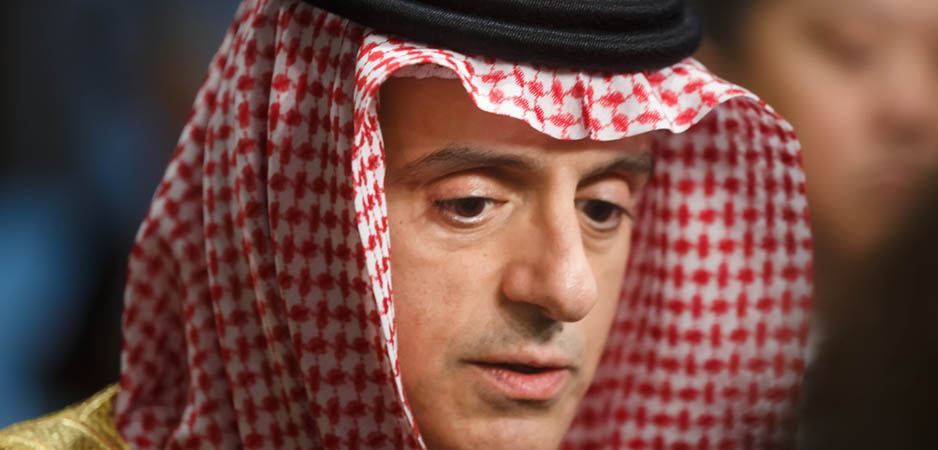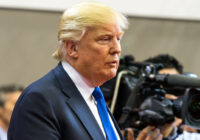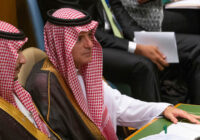Saudi Arabia regrets its “mistakes” and hopes the world will magnanimously stop calling them crimes, The Daily Devil’s Dictionary reports.
As we have already pointed out, the Saudis’ shifting line on Jamal Khashoggi’s murder has produced a plethora of wonderful examples of euphemism and Orwellian newspeak. Finally admitting that they had tortured and murdered Khashoggi in their own consulate in Istanbul hasn’t prevented them from further continuing to torture the English language in Humpty-Dumpty fashion (see Lewis Carroll).
Initially, the Saudis claimed to be unaware of any kind of incident, but now that they have become aware, Foreign Minister Adel al-Jubeir informs us that the state of their knowledge has evolved: “We know that a mistake was committed. We know that people exceeded their authority and we know that we’re investigating them.”
Here is today’s 3D definition:
Mistake:
Anything from a typographical error to premeditated murder when committed by political authorities and their agents. A “mistake” is clearly contrasted with the notion of “crime,” which typically consists of producing critical assessment of the same authorities in a public platform.
Contextual note
Jubeir had previously called this “a tremendous mistake,” so at least the Saudis’ story is more consistent than it was in the first two weeks after the event.
Another delightfully useful word Jubeir reminds us of is “hysterical.” Though in modern English it has also come to mean “extremely funny,” the word still holds its original meaning related to the behavior of victims of hysteria, defined clinically as imaginary illness or metaphorically as a wildly delusional belief.
“This issue has become fairly hysterical,” Jubeir complains, contrasting the undisciplined emotion of those who object to premeditated murder with the level-headedness and sangfroid of those who plan both the murder and its cover-up.
But the Saudis aren’t the only ones to make “mistakes.” Interviewing Lyle Jeremy Rubin, a budding historian and veteran of the still evolving American war in Afghanistan, seasoned journalist Robert Scheer cites the figure put forward by Lyndon Johnson’s secretary of defense, Robert McNamara, of 3.5 million “innocent people in Vietnam … killed in a war that made no sense.”
In the interview, Scheer alludes to the message of filmmaker Ken Burns in his recent TV documentary about that war: “It’s just we make mistakes. Other people commit genocide, murder, invade, and so forth.”
Scheer and Rubin agree that this has become the mantra of even the liberal media in the US. They fail even to talk about ongoing wars and if on occasion they do, excuse them as “mistakes,” precisely because, like the Saudis, calling them mistakes that result in people’s deaths means that they are neither crimes nor wars. Just humanitarian campaigns that may have gone wrong.
Historical note
In his most surreal moment, Jubeir offers this reflection on history, delineating an imagined contrast between Saudi Arabia and Iran: “One is a [Saudi] vision of light … One is [an Iranian] vision of darkness which seeks to spread sectarianism throughout the region. History tells us that light always wins out against the dark. … The question is how do we defeat them.”
Jubeir shows himself worthy of Donald Trump by turning historical truth on its head and inventing new categories of moral worth. Iran certainly does support Shia Islam in neighboring countries, but Saudi Arabia has been the historic champion in promoting Wahhabi extremism across the globe. Moreover, religious tolerance is written into Iran’s constitution and houses of worship of other religions exist, in contrast to Saudi Arabia, which bans the practice of other religions and considers the Qur’an to be its constitution.
Shiism, the official religion of Iran, is one branch of Islam, like Catholicism in Christianity, but Wahhabism — a particularly virulent, intolerant, violent and extremist fundamentalism — has historically been identified with Saudi Arabia’s state religion. It’s true that Crown Prince Mohammed bin Salman, the Saudi reformer, has attempted to reduce the influence of the Wahhabi clerics in the interest of consolidating his own power. But his brand of more secular violence, as demonstrated by the brutality of his war on Yemen, can hardly be considered a “vision of light.”
A quick glance at history tells us that Iran, with its roots in ancient Persia, has, over the past three millennia, built a rich and prestigious culture and tradition of science that, despite the current obscurantism of its own theocratic clerics, are still a vital part of the nation’s identity. The same cannot be said of Saudi Arabia, which, apart from its status as the birthplace of Islam, has only recently acquired the material resources (oil and money) needed to build over time a civilization on a par with Iran’s.
So where is Adel al-Jubeir’s light coming from? The glimmer on the oil seeping out of the ground? Or perhaps the tendentious propaganda spawned by the recently founded Arabia Foundation in Washington?
To seal his case, Jubeir spoke of the “iron-clad” ties between Riyadh and Washington and “praised what he described as the ‘rational, realistic’ foreign policy of the current U.S. administration.” He didn’t bother to define what he meant by “rational” and “realistic” — epithets that few other leaders or pundits across the globe attach to Trump’s foreign policy — but it sounds as if he means it’s the perfect complement to Mohammed bin Salman’s “vision of light.” Unless that’s just a “mistake” in his understanding of geopolitics.
*[In the age of Oscar Wilde and Mark Twain, another American wit, the journalist Ambrose Bierce, produced a series of satirical definitions of commonly used terms, throwing light on their hidden meanings in real discourse. Bierce eventually collected and published them as a book, The Devil’s Dictionary, in 1911. We have shamelessly appropriated his title in the interest of continuing his wholesome pedagogical effort to enlighten generations of readers of the news. Updated: October 30, 2018.]
The views expressed in this article are the author’s own and do not necessarily reflect Fair Observer’s editorial policy.
Support Fair Observer
We rely on your support for our independence, diversity and quality.
For more than 10 years, Fair Observer has been free, fair and independent. No billionaire owns us, no advertisers control us. We are a reader-supported nonprofit. Unlike many other publications, we keep our content free for readers regardless of where they live or whether they can afford to pay. We have no paywalls and no ads.
In the post-truth era of fake news, echo chambers and filter bubbles, we publish a plurality of perspectives from around the world. Anyone can publish with us, but everyone goes through a rigorous editorial process. So, you get fact-checked, well-reasoned content instead of noise.
We publish 2,500+ voices from 90+ countries. We also conduct education and training programs
on subjects ranging from digital media and journalism to writing and critical thinking. This
doesn’t come cheap. Servers, editors, trainers and web developers cost
money.
Please consider supporting us on a regular basis as a recurring donor or a
sustaining member.
Will you support FO’s journalism?
We rely on your support for our independence, diversity and quality.






